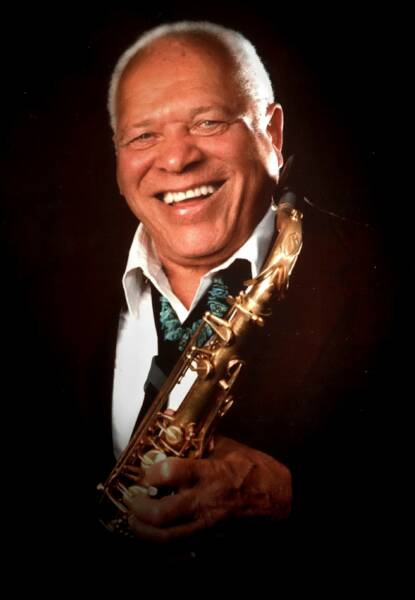All Content and Pictures Protected by Copyright
Copyright 2013 Franzjackson.com
Chicago Sun Times
January 21, 1994
Original 'Aunt Jemima' Could Really Pour It On
Author: Dave Hoekstra
The late jazz singer Edith Wilson developed much of her bawdy phrasing and buoyant soul from years of portraying Aunt Jemima, first on radio and later in advertisements and appearances at pancake breakfasts.
She sang for batter or for worse.
Wilson's rambunctious final recording, "He May Be Your Man," has been reissued by Delmark Records. It was recorded in the summer of 1973 and spring of 1975 and features a seven-piece all-star band anchored by the late Otis Rush pianist Little Brother Montgomery.
Playing deep in the trail of Wilson's sassy vocals are the likes of Club De Lisa/Joe Williams drummer Red Saunders and traditional clarinet-saxophonist Franz Jackson. You can catch Jackson blowing living history at 8 p.m. Saturday with Ted Butterman's (who plays at Wrigley Field) Memorial Dixieland Jazz Band at the Hideaway Lodge, 35 W. 337 Riverside Dr. in St. Charles (708-741-1244), and 7 p.m. Sunday with trombonist Jim Beebe's Chicago Jazz at Dick's Last Resort, 435 E. Illinois (312-836-7870). Jackson recalled how Wilson could carry out a lyric.
"Despite her age, she had a very clear delivery," Jackson said of the 1975 session done when Wilson was 69. Wilson died of a stroke in March, 1981.
Jackson credited Wilson's staying power to her 18-year career as Aunt Jemima. In 1899, a St. Joseph, Mo., newspaperman cooked up the idea of a self-rising pancake mix. The name Aunt Jemima was coined from a song by the Baker & Farrell vaudeville team, which rolled through St. Joseph that fall.
"Edith went to schools and towns all over the country singing at breakfasts until the NAACP said she presented a bad image," Jackson recalled. Due to pressure from civil rights groups, Quaker Oats dropped the public Jemima persona in 1965. But during the late 1930s Wilson's Jemima was so popular that Quaker Oats created several regional Jemimas. Jackson's first wife, Maxine Johnson, was an East Coast representative.
"I was a flatfoot singer," Maxine Johnson said from her home in Champaign, Ill. "I'd wear furs and makeup. I never wore a mammy bandana. I wore it as a turban. The title `Aunt Jemima' never intimidated me. It was up to me to make it all as glamorous as possible. I really enjoyed it."
Wilson's vaudeville training served her well. During the 1930s she appeared with Fats Waller and Louis Armstrong in a revue called "One Thousand Pounds of Harmony," and Wilson was featured in Waller's hit show "Hot Chocolates," in which she sang "What Did I Do to Be So Black and So Blue," which Waller wrote for her.
On the "He May Be Your Man" sessions, Jackson's fluent, traditional sound peppers saucy tunes such as "My Handy Man Ain't Handy Anymore," the "Twiddlin" tribute to old folks and the show 'n' tell title track, on which Wilson crows, ". . . He may be your man . . . but he comes to see me sometimes." The recording's bonus is Montgomery's barrelhouse piano. Until his death at age 79 in 1985, Montgomery always played with one foot in a southern brothel, where he cut his chops.
"He got on the record because he worked in a band I had at the Red Arrow jazz club in Stickney between 1957 and 1967," Jackson said. In fact, Jackson's newest recording is "A Night at Red Arrow," a live 1961 recording that features Jackson standards such as "St. James Infirmary" and "Mack the Knife." (Available by writing Pinnacle Records, Box 21472, Chicago 60621. CDs are $17, cassettes $12, handling included).
The 81-year old Jackson recently arrived at the 80th birthday party for drummer Barrett Deems with the sly salutation of "This ain't nothing." He has tried to maintain a realistic view toward the evolution in race relations he has seen in his lifetime.
"The Aunt Jemima routine wasn't done for what a lot of people took it to be," he said. "There was a lot of that already going on in minstrel shows. I put my head in the sand to a lot of that. Otherwise you're always mad at people and situations. Prejudice is a feeling you have to tuck away. I've seen too many people spoil their lives by carrying that chip on their shoulder."
